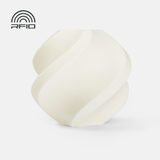Order Info
- Free Shipping over €55 (most EU countries)
- Free Shipping over €119 (Norway, Cyprus, Malta, Switzerland)
- Shipping rates vary by locations. See our Shipping Policy for details.
Bambu ASA
Bambu ASA is a highly durable material that offers exceptional UV, weather, mechanical, and thermal resistance. Its unique combination of properties makes it an ideal material for printing outdoor models (plant signs, mailboxes, wind vanes, etc.) and structural parts that require long-term exposure to challenging outdoor conditions.
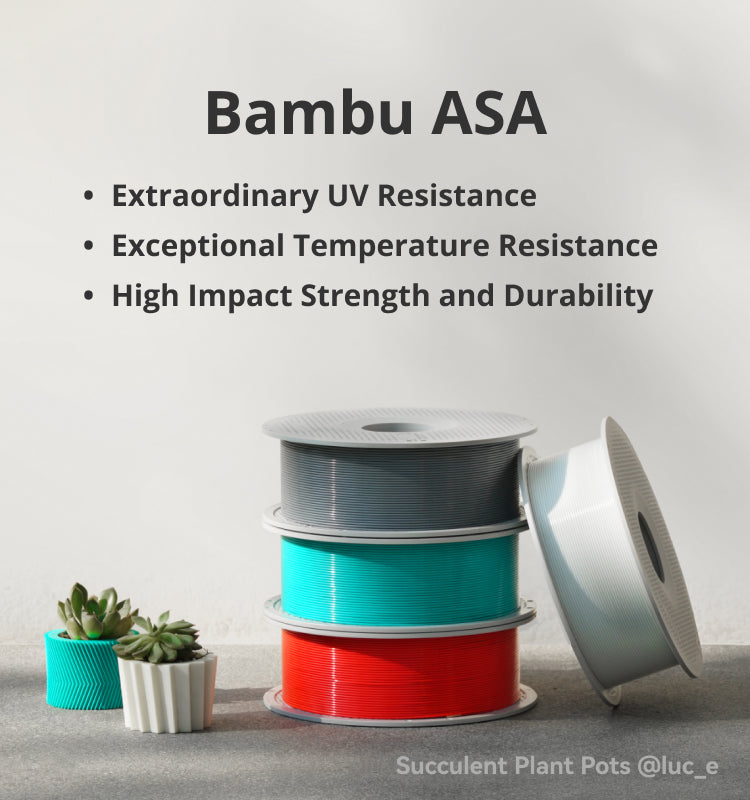
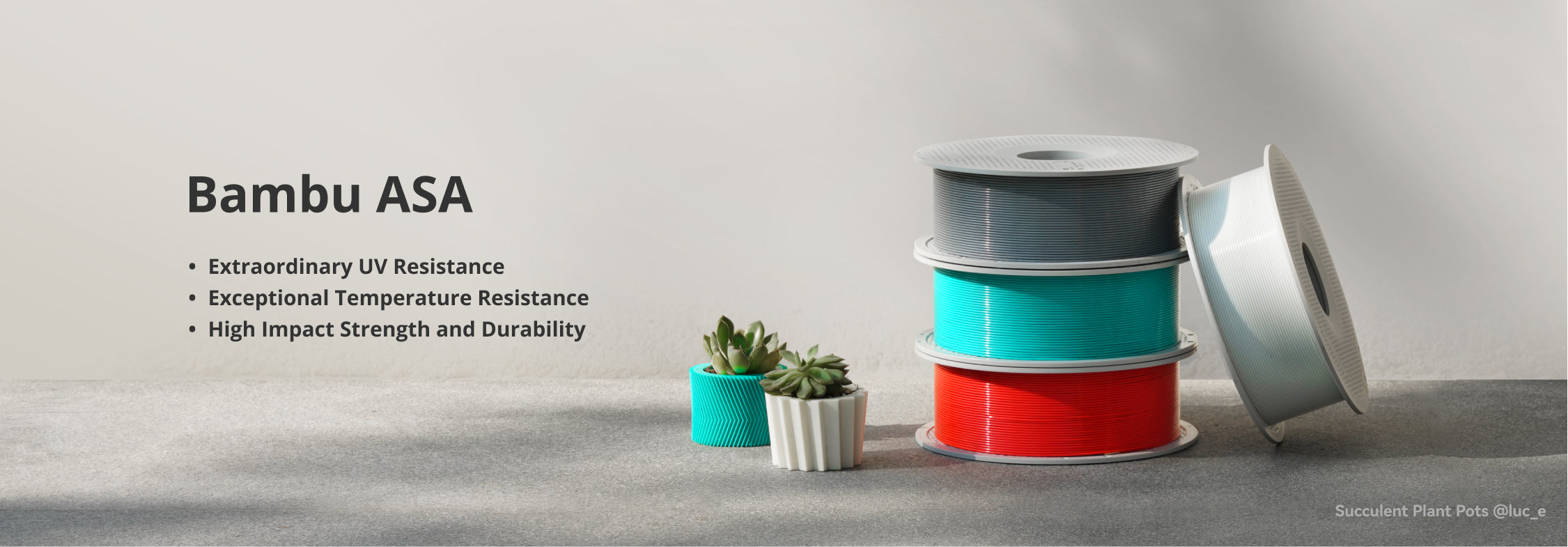
Extraordinary Weather & UV Resistance
Bambu ASA offers extraordinary UV, oxidation, and aging resistance, providing effective protection against breakage and color degradation when used outdoors for long-term purposes.
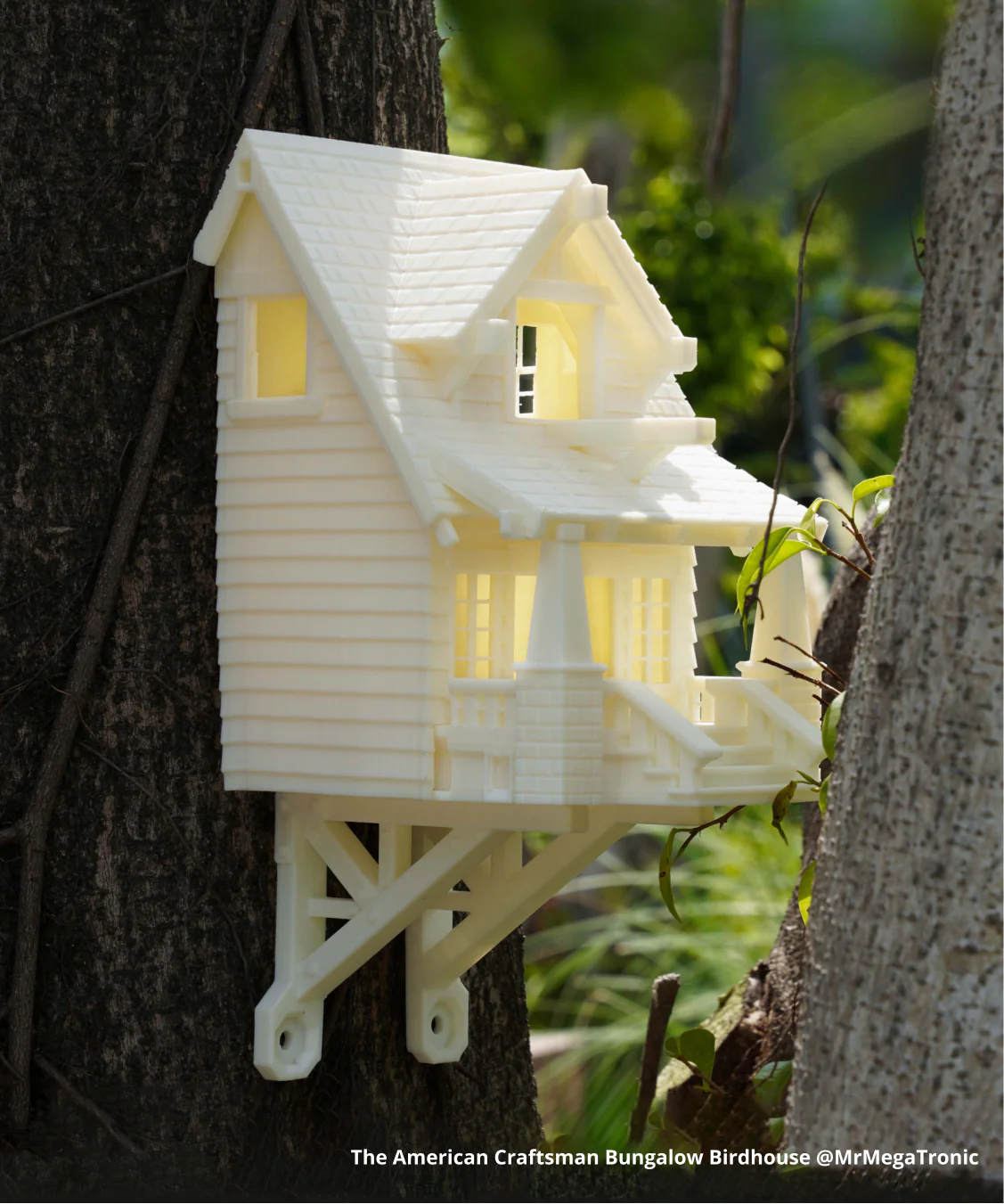
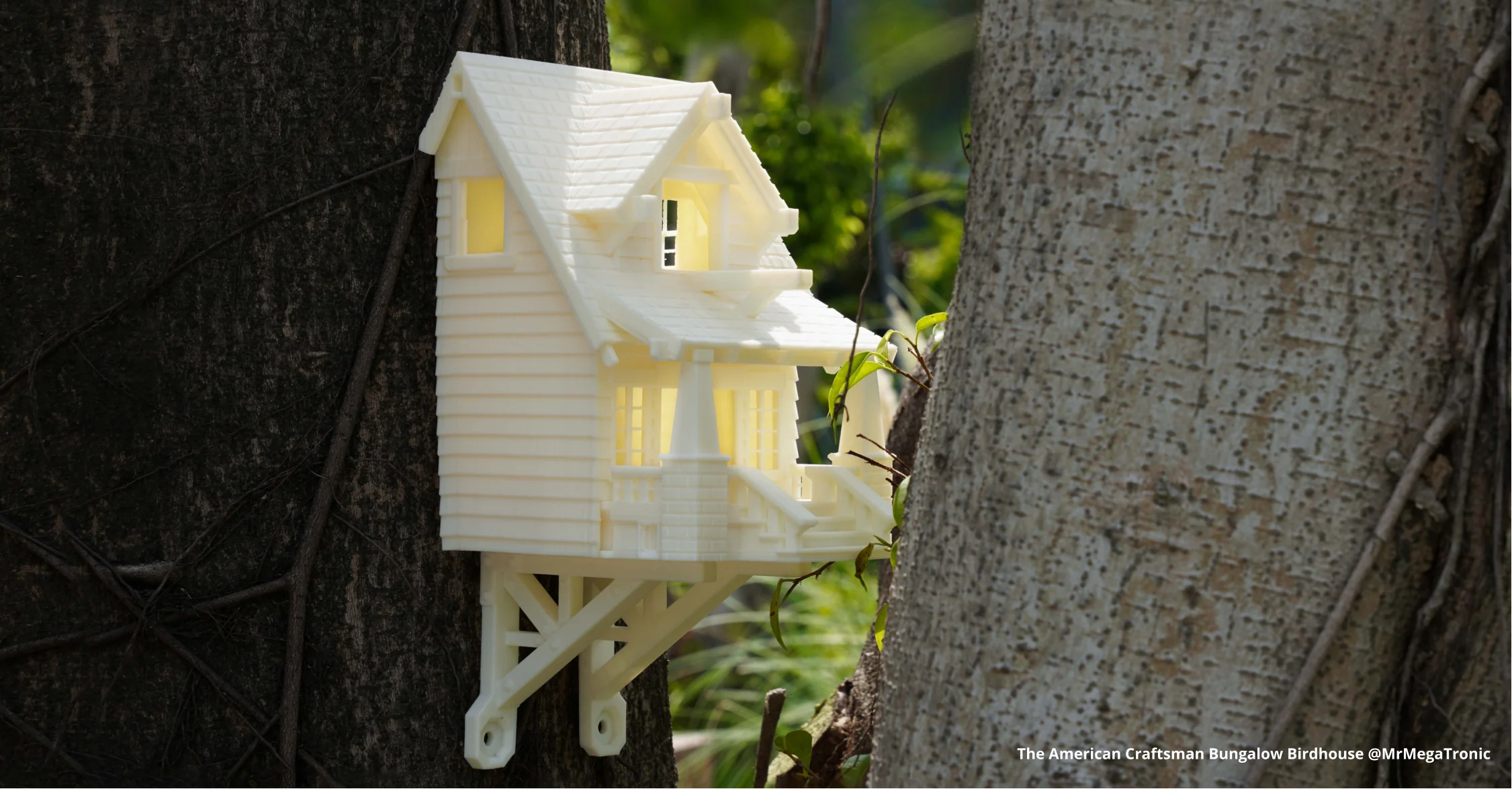




Tough and Durable
Suitable for outdoor applications and regular structural requirements due to its toughness and high impact strength.




Better Temperature Resistance
Compared to normal PETG or ABS, Bambu ASA can remain in shape even at a temperature of 100°C.



Frequently Asked Questions
1. What's the difference between ABS and ASA?
| ABS | ASA | |
| Composition | acrylonitrile - butadiene - styrene | acrylonitrile - styrene - acrylate |
ASA is a modified version of ABS that contains an additional acrylate component, which improves its weather adaptability and UV resistance.
ASA retains the impact resistance and processability of ABS while providing better resistance to fading, yellowing, and degradation from sunlight exposure. Both of them may release pungent and unpleasant odors during printing, but the pungent odor of ASA is notably lighter than ABS.
2. What is the difference applications between ABS and ASA?
ASA is ideal for outdoor applications, such as automotive exterior parts, signage, and outdoor equipment, thanks to its enhanced weather resistance and color stability. ABS is a versatile material with excellent mechanical properties that is commonly used for indoor applications.
3. What are the similarities between ABS and ASA?
In terms of physical and mechanical properties, both exhibit good impact resistance and high tensile strength, with almost the same levels of strength, toughness, and stiffness. Both ABS and ASA may release pungent and unpleasant odors during printing and the same warping tendency and enclosed printer requirement when printing large-size and/or high infill density models.
Parameters Comparison
Learn more different filaments comparison on Bambu Filament Guide >>
| ABS | ASA | PC | |
| Price / kg | $27.99 | $29.99 | $39.99 |
| Composition | acrylonitrile - butadiene - styrene | acrylonitrile - styrene - acrylate | Polycarbonate |
| Hotend Compatibility | All Size/Material | ||
| Build Plate Compatibility | Smooth PEI Plate, Textured PEI Plate | ||
| AMS Compatibility | Yes | Yes | Yes |
| Glue | Bambu Liquid Glue/Glue Stick | Bambu Liquid Glue/Glue Stick | Glue Stick |
| Dry Out Before Use | Recommended | Recommended | Required |
| Odor During Printing | Pungent odor | Relatively lighter pungent odor | Light phenol-flavored odor |
| Toughness (Impact Strength - XY) | 39.3 kJ/m² | 41.0 kJ/m² | 34.8 kJ/m² |
| Strength (Bending Strength - XY) | 62 MPa | 65 MPa | 108 MPa |
| Stiffness (Bending Modulus - XY) | 1880 MPa | 1920 MPa | 2310 MPa |
| Layer Adhesion (Impact Strength - Z) | 7.4 kJ/m² | 4.9 kJ/m² | 9.0 kJ/m² |
| Heat Resistant(HDT, 0.45 MPa) | 87 ℃ | 100 ℃ | 117 ℃ |
| Saturated Water Absorption Rate / % (25 °C,55% RH) | 0.65% | 0.45% | 0.25% |
Accessory Compatibility
| Recommended | Not Recommended | |
| Build Plate | Smooth PEI Plate, Textured PEI Plate | Cool Plate SuperTack |
| Hotend | Hotend with Hardened Steel Nozzle 0.4 mm Hotend with Stainless Steel Nozzle 0.4 mm |
Hotend with Hardened Steel Nozzle 0.6 mm / 0.8 mm Hotend with Stainless Steel Nozzle 0.2 mm |
| Glue | Bambu Liquid Glue Glue Stick |
/ |
ASA Hex Code Table
| Color | Hex Code | Display |
| White | #FFFAF2 | |
| Gray | #8A949E | |
| Red | #E02928 | |
| Green | #00A6A0 | |
| Blue | #2140B4 | |
| Black | #000000 |
RFID for Intelligent Printing
All printing parameters are embedded in RFID, which can be read through our AMS (Automatic Material System).
Load and print! No more tedious setting steps.


| Recommended Printing Settings | |
| Drying Settings (Blast Drying Oven) | 80 °C,8 h |
| Printing and Keeping Container's Humidity | < 20% RH (Sealed, with Desiccant) |
| Nozzle Temperature | 240 - 270 °C |
| Bed Temperature (with Glue) | 80 - 100 °C |
| Printing Speed | < 250 mm/s |
| Physical Properties | |
| Density | 1.05 g/cm³ |
| Vicat Softening Temperature | 106 °C |
| Heat Deflection Temperature | 100 °C |
| Melting Temperature | 210 °C |
| Melt Index | 7.0 ± 0.8 g/10 min |
| Mechanical Properties | |
| Tensile Strength | 37 ± 3 MPa |
| Breaking Elongation Rate | 9.2 ± 1.4 % |
| Bending Modulus | 1920 ± 130 MPa |
| Bending Strength | 65 ± 5 MPa |
| Impact Strength | 41.0 ± 2.3 kJ/m² |
Printing Tips
• Pungent and unpleasant odors may be released during printing. Make sure your printer is placed in a well-ventilated area.
• Drying conditions: 80 ℃ for 8 hrs. Store in a dry environment after use. Dry before use if the material absorbs moisture. For more details please refer to: Filament drying instructions on WIKI.
• ASA is prone to warping when printing large size and/or high infill density model. To avoid warping: 1) Not recommemded to print too large size and/or high infill density models. 2) Use enclosure printers and ensure the build plate is properly glued before printing. 3) Set lower printing speed and higher heatbed temperature. For more details please refer to: Common print quality problems and solutions on WIKI.
What's in the Box


Filament with Spool*1 & Desiccant*1


Package*1



